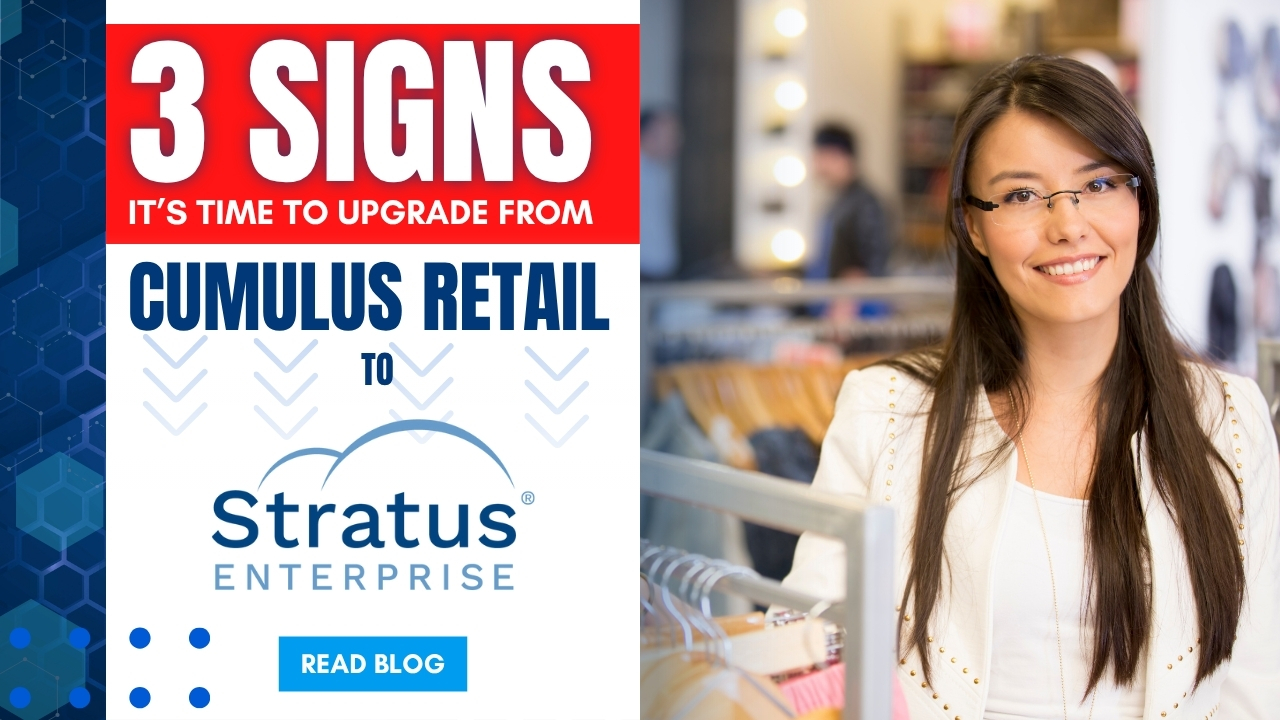Blog
3 Signs It’s Time to Upgrade from Cumulus Retail to Stratus Enterprise
November 25, 2025 / 10 minute read / By Zoya Naeem

Blog

Have you reached a point where Cumulus Retail is meeting your basic needs, but your day-to-day operations are starting to feel a little too big for it? Maybe your team is asking for features that aren’t available, your stores are relying on more manual workarounds, or you’re finding it harder to keep everything consistent across locations. These are common growing pains, and they often show up long before a retailer decides it’s time for something more powerful.
Cumulus Retail is designed for SMB retailers who want a simple, affordable, cloud-based system. As your business expands, the system can still support you, but there comes a stage where the workflow, speed, and flexibility your team needs point toward Stratus Enterprise instead.
In this blog, we will walk through the three signs that tell you it may be time to transition from Cumulus Retail to Stratus Enterprise:
We will also cover the most common questions retailers ask before upgrading, and provide guidance on how to evaluate whether this transition makes sense for your business right now.
Cumulus Retail gives smaller and mid-sized retailers exactly what they need to run day-to-day operations. It is a lighter version of Stratus Enterprise, quick to use, and budget-friendly, which is why many retailers choose it as their first unified POS and eCommerce system. But as your business grows, the way you manage purchasing, reporting, staffing, and customer programs grows with it. That is usually when the limits of Cumulus Retail begin to show.
Retailers who upgrade often describe the same turning points.
They reach a stage where:
When you reach this point, you are looking for tools that can handle more advanced workflows without creating extra steps for your team.
This is where Stratus Enterprise becomes the natural next step. It is designed for retailers who need:
If you consistently feel like you are outgrowing your current workflow in Cumulus Retail, this is often the first sign that Stratus Enterprise may be a better fit.
Related: How Much Does Cumulus Retail Cost?
As retailers grow beyond one or two locations, the demands on inventory movement change quickly. Cumulus Retail does support multi-store setups, but many growing businesses reach a point where transfers happen more often, inventory is constantly shifting, and staff need instant visibility into what is available across the company. That is usually when the limits start to feel tight.
This is especially true when you are trying to keep shelves stocked across several stores. You may have already experienced slow transfer communication, inconsistent stock counts between locations, or delays in updating availability on your website. If this happens often, it becomes clear that you need a more powerful system to handle the pace of your business.
Stratus Enterprise steps in with a much deeper set of multi-store controls. Retailers who upgrade usually point to a few specific benefits. You can create transfer requests inside the system, route them for approval, and track them from start to finish. All locations sync in real time, so your staff can rely on the numbers in front of them without second-guessing. Permissions can be tailored more precisely so only the right people can approve or adjust transfers. Workflows like BOPIS also become easier because the system understands where stock is and where it needs to go.
Cumulus Retail is designed to be a streamlined, affordable system that works well for most growing retailers. Because it is built this way, it follows a standard structure so you can get up and running quickly without needing to reinvent anything. For many businesses, that simplicity is exactly what they want.
As operations expand, needs often become more specific. You may need a checkout flow that aligns with how your team operates. You might need discount rules that follow complex conditions. You may want a new third-party integration that supports a unique part of your business. Some retailers even reach a point where their reporting requirements go well beyond standard templates. At that stage, the limits of a standard system can start to show.
Stratus Enterprise is built for this level of customization. It offers a much wider range of options, so the software can adapt to your business instead of asking your business to adapt to the software. This includes the ability to customize the POS experience, tailor back-office workflows, build advanced eCommerce features, and support API-driven integrations. It is also flexible enough to accommodate hybrid business models that involve services like gunsmithing, rentals, repairs, memberships, and training programs.
Before retailers make the move from Cumulus Retail to Stratus Enterprise, they usually want a clear picture of what the transition looks like behind the scenes. So, we sat with Quinn McKee, one of our Implementation Managers for Stratus Enterprise, to get answers to some of the most frequently asked questions from retailers:
Stratus Enterprise includes everything Cumulus Retail has, but it is built to support retailers who require more comprehensive control. This includes more advanced reporting, more flexible back office workflows, stronger multi-store tools, expanded inventory options, and the ability to customize screens and processes.
Stratus Enterprise is primarily designed for businesses that have grown beyond standard workflows and require a platform that can adapt to their structure, rather than the other way around.
If your team is running into limits with reporting, multi-store operations, or workflow flexibility, it may be the right moment to pause and evaluate your setup. A quick review with your Celerant representative can help you understand which tools you need now, which ones you may need later, and how the transition would work for your business.
If you’d like to walk through your operations with someone who can identify areas where Stratus Enterprise could make a difference, we are here to help.